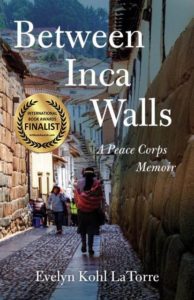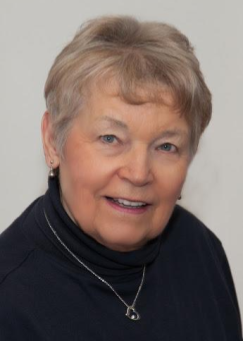FOR IMMEDIATE RELEASE:
SAN FRANCISCO — To say writer and educator Evelyn Kohl LaTorre has been around the world would be an understatement — she’s visited over 100 countries and counting! But this wanderlust first blossomed at an early age with her love affair with Latin American culture and a yearning for a life full of purpose, passion, and adventure, all detailed in her new memoir, “Between Inca Walls,” (Aug. 11, She Writes Press.)
In 1964, LaTorre becomes a volunteer for the newly formed Peace Corps and is sent to a rural mountain town in the Andes of Peru, where she and her roommate find a new sense of liberation and empowerment while discovering their place within the community. Over the course of 18 months, LaTorre teaches indigenous children in schools with dirt floors, trains shoeless students for marching competitions, and infuses herself in peasant farmer politics, all the while falling in love with a local university student.
 And with this newfound romance, LaTorre fights an ongoing battle between head and heart: Does she adhere to the restrictive structures of her religious youth, or does she follow her passions toward an endless path of possibility?
And with this newfound romance, LaTorre fights an ongoing battle between head and heart: Does she adhere to the restrictive structures of her religious youth, or does she follow her passions toward an endless path of possibility?
LaTorre’s poignant narrative takes readers on a journey across both international borders and social barriers, as well as among languages, traditions, and cultures. Her emotional chronicles will speak to adventurers of every age, as well as those seeking transformation of their own.
“Between Inca Walls: A Peace Corps Memoir”
Evelyn Kohl LaTorre | Aug. 11, 2020 | She Writes Press
Memoir/Travel | Paperback | 978-1-63152-717-3 | $16.95
Early praise for “Between Inca Walls”
“Evelyn LaTorre creates a masterful portrait of place — from the Montana hills to the peaks of Peru — and illustrates how place shapes us. The many lovely metaphors and descriptions throughout the book invite the reader to see through the eyes of an innocent girl as she discovers exotic, lively cultures; absorbs the colors, sounds, passion, and intensity of that new world; and allows it to change her life path.”
— Linda Joy Myers, president of the National Association of Memoir Writers
“Walls typically keep people and things both in and out. In this memoir of her days as a Peace Corp Volunteer, Evelyn LaTorre breaks down those walls and tells a story of establishing relationships and projects in the mountains of Peru in the ’60s — a fascinating story of challenges faced in learning about oneself through the eyes of another culture. Once you start reading, you won’t want to put it down.”
— Dr. Jackie M. Allen, MFT, Associate Professor of Education, University of La Verne
“Scenes remain in my mind as if these stories had been my own. I found myself caught up in adventure after adventure, from copper ovens to shoeless kids playing soccer, from busy cities with cobblestone streets to roads that clung to the sides of mountains. I became captivated by Evelyn’s community of students and peers and the man who became Evelyn’s big love.”
— Charlotte Robin Cook, MFA, former publisher, current story editor,
and head fiction judge for the Next Generation Indie Book Awards
“Travel with Evelyn LaTorre during the early chaotic days of the Peace Corps as she arrives in Peru and must navigate finding housing and a suitable volunteer job in an unfamiliar land whose language she barely speaks. Along the way, she also finds friends, love, and respect for a new culture. An inspiring journey.”
— Tish Davidson, editor of the California Writers Club 2019 Literary Review
“Evelyn LaTorre made two trips. The first, in 1964, was an expedition to Peru with the Peace Corps. The second was in her memoir by retelling the story of that transforming experience.”
— Alaide Ventura Medina, award-winning author of “Como Caracol”
“One of the most enjoyable aspects of my position as President and CEO of NPCA is hearing stories of Peace Corps Volunteers, especially those from the early years. In Between Inca Walls, Evelyn Kohl LaTorre describes her many adventures serving as a community development volunteer in rural Peru in the 1960s. It’s fabulous. I really enjoyed it!”
— Glenn Blumhorst, president and CEO, National Peace Corps Association
About The Author
 EVELYN KOHL LaTORRE grew up in rural Southeastern Montana, surrounded by sheep and cattle ranches, before coming to California with her family at age 16. She holds a doctorate in multicultural education from the University of San Francisco, and a master’s degree in social welfare from UC Berkeley. She worked as a bilingual school psychologist and school administrator in public education until her retirement. Evelyn loves to travel; to date, she and her husband have traveled to some 100 countries. You can view her stories and photos on her website, www.evelynlatorre.com.
EVELYN KOHL LaTORRE grew up in rural Southeastern Montana, surrounded by sheep and cattle ranches, before coming to California with her family at age 16. She holds a doctorate in multicultural education from the University of San Francisco, and a master’s degree in social welfare from UC Berkeley. She worked as a bilingual school psychologist and school administrator in public education until her retirement. Evelyn loves to travel; to date, she and her husband have traveled to some 100 countries. You can view her stories and photos on her website, www.evelynlatorre.com.
Her writing has appeared in World View Magazine, The Delta Kappa Gamma Bulletin, the California Writers Club Literary Review, the Tri-City Voice, Dispatches and Clever Magazine. She is currently completing a second book about the struggles and triumphs of a bicultural marriage in the U.S.
In an interview, Evelyn can discuss:
- Her love for travel and experience visiting over 100 countries
- Travel writing and how her experiences abroad have influenced her as an author and an educator
- How her experiences in the early days of the Peace Corps differ from those volunteers have now
- How her time in South America has shaped her life and the value of travel, social activism and education
- Her career as an educator and the importance of acquiring a multicultural education
An Interview with Evelyn Kohl LaTorre
1. What initially drew you to the Peace Corps, which at the time was just a fledgling organization compared with what it is today, and did you have any say over where they sent you?
When in college in 1962-63, I worked weekends with other college students who helped Cesar Chavez take a census of migrant workers in the Fresno area. The warmth, food and music of the Mexican culture captivated me. I joined with a group of college students, called Amigos Anonymous, and in summer 1963, I lived in a small Mexican town where we started a school and a library. Joining the Peace Corps was a logical next step. I requested an assignment to Peru because a boy I liked, who’d worked with me taking the census in the Fresno area, had joined the Peace Corps and been assigned to Peru.
2. What impact do you think your experiences have had on your identity as an author? Did writing your memoir make you more aware of this?
I’ve loved reading and writing since I learned how in first grade. I write what I’m passionate about. I’ve been attracted to the Hispanic culture since I discovered it at age 19. I was often hired to work with Mexicans and Latin Americans because of my fluency in Spanish, so the culture has been some part of me for the past 60 years. Marrying a Peruvian also keeps me closely allied to that identity. Writing my memoir required me to put in words the way I’d always felt. It made me more aware of all parts of me.
3. What advice do you have to travelers looking to forge meaningful experiences?
I truly believe that living abroad helps one develop a clearer sense of self. Adjusting to all kinds of unknown circumstances and communicating in foreign languages as one travels abroad, results in a more open and flexible world view. Foreign travel develops self-reliance and self-confidence. Being exposed to different — and maybe better — ways of being and doing, encourages one to question one’s own country and identity.
4. Can you describe the experience of becoming exposed to Latin American culture for the first time?
Full immersion in a Hispanic country is covered in the first chapter of “Between Inca Walls,” when I tell about the difficulties in crossing the border from San Isidro to Tijuana, Mexico. My first experience in Parlier, California, where I volunteered weekends enthralled me with the sensuous nature of the music, food, colors and ways of enjoying life to the fullest. I admired the way the Mexican migrants were so accepting, nonjudgmental, and loving of others. It was so different from my strict Catholic, German-English upbringing.
5. Did you experience any sense of culture shock between your early travels from Montana to California and finally Peru?
No way. I loved seeing the mountains and the ocean for the first time when, at age 15, I traveled by rail from Montana with my family to visit relatives on the West Coast. The following year, I eagerly left the limited opportunities available in the cattle country of Southeastern Montana to move to California for my father’s job. I hadn’t fit in to the cowboy culture in so many ways.
6. What advice do you have for women facing similar choices today that you faced in the late ’60s and early ’70s?
You don’t always get what you want, you may get what you need instead. Follow your desires, instincts and your heart. You are stronger than you imagine. Don’t let others’ narrow opinions influence yours. Things can work out and challenges may bring you rewarding adventures that you’ll never forget. One needs to take risks in life. You can be what you decide to be through your own efforts, though it’s helpful to have family, luck and opportunity beneath your wings to carry you along.
7. Was it difficult for you while writing the book to disclose personal information and stories? How do you decide what information to include and what topics are off-limits?
Yes, very. Lesser people like to judge others’ decisions when they don’t match their own narrow views. I remember the day I presented the chapter about the circumstances of my first pregnancy to my writer’s critique group that had some men in it. But I soon discovered that writing about embarrassing incidents takes away the embarrassment and shame. It is a relief to be honest, which one must be in a memoir.
My husband is a very private person and insisted I change his name and not put any photos of him in my memoir.

A former award-winning journalist with national exposure, Marissa now oversees the day-to-day operation of the Books Forward author branding and book marketing firm, along with our indie publishing support sister company Books Fluent.
Born and bred in Louisiana, currently living in New Orleans, she has lived and developed a strong base for our company and authors in Chicago and Nashville. Her journalism work has appeared in USA Today, National Geographic and other major publications. She is now interviewed by media on best practices for book marketing.
